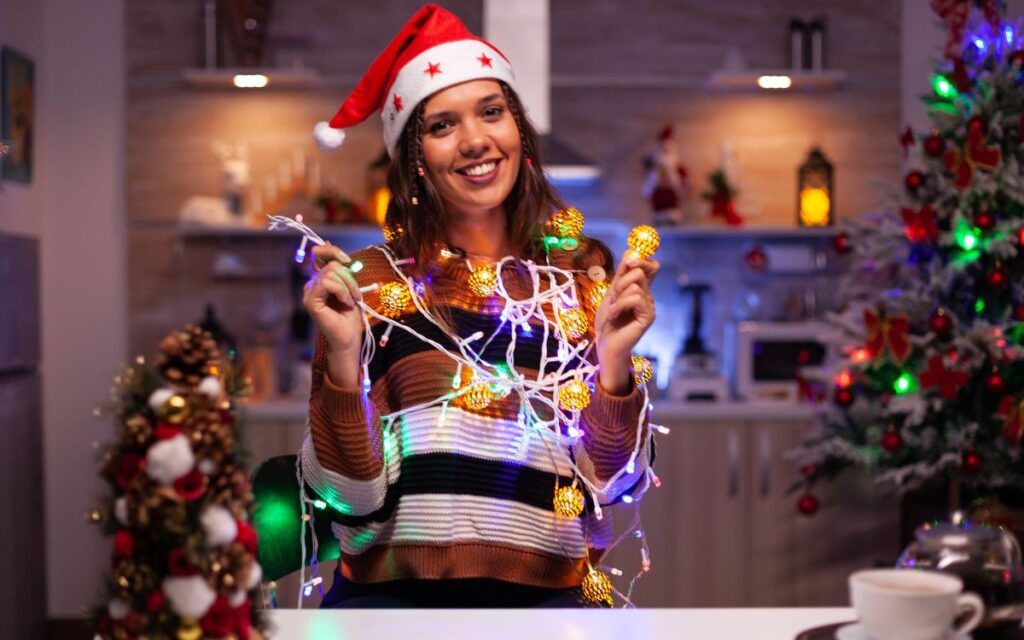
The search for “Christmas lights near me” marks the beginning of a magical journey into the heart of holiday festivities. As winter evenings grow longer, communities across the country transform into sparkling wonderlands, each twinkling light adding to the season’s enchantment. This comprehensive guide will help you discover the most spectacular holiday light displays in your area, from professional installations at botanical gardens to charming neighborhood decorations. Whether you’re planning a family outing, a romantic evening, or simply seeking to immerse yourself in the holiday spirit, we’ll explore everything you need to know about finding, enjoying, and even creating magical Christmas light experiences in your local area.
Types of Christmas Light Displays
Professional Light Shows and Events
Professional light shows represent the pinnacle of holiday illumination artistry. These meticulously planned displays often feature:
– Synchronized music and light shows
– Interactive elements and walking paths
Professional sound systems
Animated displays and light tunnels
Themed areas and storytelling elements
Many venues like botanical gardens, zoos, and theme parks invest hundreds of thousands of dollars in creating these spectacular displays, often starting their planning process months in advance.
Neighborhood Light Displays
Community-driven displays bring a personal touch to holiday lighting. These can range from single decorated homes to entire streets coordinating their displays. Notable features include:
Individual home decorations
Synchronized neighborhood displays
Charity fundraising events
Community competitions
Drive-through residential areas
Commercial District Displays
Downtown areas and shopping districts often create elaborate displays to attract visitors and shoppers:
Main street decorations
Shopping mall installations
Restaurant and store window displays
Public square celebrations
Corporate building illuminations
How to Find the Best Displays
Online Resources and Tools
Several digital platforms help locate nearby Christmas light displays:
| Platform | Features | Best For |
|———-|———-|———–|
| ChristmasLightFinder.com | Interactive maps, user reviews | Finding residential displays |
| Facebook Events | Local event listings, community recommendations | Discovering organized shows |
| NextDoor | Neighborhood updates, local recommendations | Hidden neighborhood gems |
| Instagram Location Tags | Real-time photos, visitor experiences | Preview of displays |
| Local Tourism Websites | Official event calendars, ticket information | Professional shows |
Mobile Apps for Light Hunting
Specialized apps have emerged to help holiday light enthusiasts:
Christmas Light Finder
Holiday Light FindAR
Nextdoor
Google Maps (with holiday overlay)
Local city apps
Community Resources
Local sources often provide the most up-to-date information:
Local newspapers and news websites
Community bulletin boards
Chamber of Commerce websites
Parks and Recreation departments
Local radio stations
Planning Your Light-Viewing Experience
Best Times to Visit
Timing your visit can significantly impact your experience:
Weekdays tend to be less crowded than weekends
Peak viewing hours: 6:00 PM – 9:00 PM
Early December usually has smaller crowds
Special events might extend hours
Weather conditions can affect visibility
Transportation Options
Personal Vehicle Tours
Create custom routes using mapping apps
Pack snacks and hot beverages
Consider fuel efficiency for longer tours
Plan bathroom breaks
Prepare appropriate music playlists
Organized Tours
Many cities offer specialized holiday light tours:
Charter bus services
Trolley tours
Horse-drawn carriage rides
Segway tours
Walking tours with guides
Photography Tips
Camera Settings
Optimal settings for capturing Christmas lights:
ISO: 400-800
Aperture: f/4 to f/8
Shutter speed: 1/15 to 1/60
White balance: Auto or Tungsten
Focus mode: Manual
Best Practices
– Use a tripod for stability
Shoot during blue hour
Capture both wide and detail shots
Include people for scale
Experiment with bokeh effects
Creating Your Own Display
Planning and Design
Basic Elements
Essential components for a successful display:
Main focal points
Color scheme
Lighting patterns
Power requirements
Installation timeline
Advanced Features
For those wanting to create more elaborate displays:
Computerized sequencing
Music synchronization
Interactive elements
Projection mapping
Smart home integration
Safety Considerations
Electrical Safety
Critical safety measures include:
Using outdoor-rated extensions
GFCI protection
Load balancing
Weather protection
Professional inspections
Physical Safety
Important considerations for installation:
Ladder safety
Proper mounting techniques
Weather considerations
Trip hazard prevention
Emergency shutdown procedures
Environmental Impact
Energy Efficiency
Modern lighting technology offers various energy-saving options:
LED lights use 90% less energy than traditional bulbs
Timer systems reduce unnecessary runtime
Solar-powered options for some displays
Energy-efficient controllers and dimmers
Smart home integration for optimal usage
Sustainable Practices
Environmentally conscious display methods:
Recycling old lights and materials
Using renewable energy sources
Minimizing light pollution
Supporting local eco-friendly vendors
Proper disposal of damaged equipment
Cost Considerations
Viewing Costs
Typical expenses for light viewing:
| Activity Type | Average Cost | Notes |
|————–|————–|——–|
| Drive-through displays | $20-30 per vehicle | Often includes audio guide |
| Walking tours | $15-25 per person | Usually 1-2 hours |
| Professional shows | $25-40 per person | May include additional activities |
| Neighborhood viewing | Free | Consider voluntary donations |
| Guided bus tours | $40-75 per person | Including transportation |
Display Creation Costs
Investment ranges for different display levels:
| Display Type | Initial Investment | Annual Maintenance |
|————-|——————-|——————-|
Basic home display | $200-500 | $50-100 |
Medium residential | $500-2,000 | $100-300 |
Advanced synchronized | $2,000-5,000 | $300-500 |
Professional installation | $5,000+ | $500-1,000 |
Special Considerations
Weather Preparation
Essential items for viewing in various conditions:
Warm clothing layers
Rain protection
Non-slip footwear
Hand warmers
Emergency supplies
Accessibility
Important factors for inclusive viewing:
Wheelchair accessible paths
Reserved parking spaces
Rest areas
Audio descriptions
Sensory-friendly times
COVID-19 Safety Measures
Current health and safety protocols:
Social distancing guidelines
Mask requirements
Timed entry systems
Contactless payment options
Sanitization stations
Regional Variations
Northern Regions
Characteristics of displays in colder climates:
Earlier start times due to shorter days
Snow enhancement effects
Indoor viewing options
Weather-resistant installations
Extended season duration
Southern Regions
Unique aspects of warmer climate displays:
Later start times
Outdoor gathering spaces
Different weather considerations
Extended viewing seasons
Unique themed elements
Frequently Asked Questions
When is the best time to see Christmas lights?
Most displays operate from late November through early January, with peak viewing times between 6:00 PM and 9:00 PM. Weekdays typically offer smaller crowds than weekends.
How much does it cost to view Christmas lights?
While neighborhood displays are usually free, professional shows can range from $20-40 per person or vehicle. Some venues offer season passes for multiple visits.
Are Christmas light displays wheelchair accessible?
Many professional venues provide accessible paths and facilities. It’s recommended to check specific locations’ accessibility features in advance.
How can I find the best Christmas light displays near me?
Utilize online resources like ChristmasLightFinder.com, local community websites, social media, and mobile apps dedicated to holiday light hunting.
What should I bring when viewing Christmas lights?
Essential items include warm clothing, comfortable shoes, camera equipment, snacks, and beverages. Consider bringing cash for donations at neighborhood displays.
How long do Christmas light displays typically last?
Most displays run from late November through the first week of January, with some extending through mid-January.
Conclusion
The search for “Christmas lights near me” opens the door to a world of wonder and holiday magic that continues to evolve and inspire. From sophisticated professional installations to heartwarming community displays, these illuminated celebrations bring joy and wonder to millions each year. Whether you’re planning to view displays or create your own, the combination of traditional charm and modern technology offers something for everyone. As we continue to embrace new technologies and sustainable practices, the future of Christmas light displays looks brighter than ever, promising to keep this beloved holiday tradition alive for generations to come.
**External Resources:**
https://www.christmaslightfinder.com
https://www.epa.gov/
